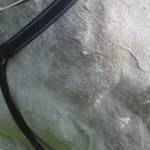Feeding to Avoid Problems at Endurance Ride Checkpoints

Poor scores at the vet gate during an endurance ride can be the first indication of trouble in some cases. Scoring poorly in any of the parameters should cause you to assess the problem and decide if there’s anything you can do to reverse it. This is especially true for multileg rides during which a rider has the opportunity to avoid elimination after the next leg, but it is also important to remember to address these issues even after completion of the ride.
There are a couple of problems that can be rectified nutritionally if noticed early enough. Generally these are the metabolic scores.
For dehydration, revisit your electrolyte supplement strategy. Consult with your veterinarian as to whether oral electrolytes would be of use (dependent on level of dehydration). Try to encourage the horse to eat a wet slurry-type feed or find some wet green forage and get as much in as possible. Feeding some dry hay can stimulate drinking. Try flavored waters. Slow down and allow more time at water stops for the horse to settle before drinking. Let the horse graze briefly near the water to stimulate thirst.
Poor gut sounds are predominantly caused by poor hydration, so follow the aforementioned tips first. Try to get bulk into the gut to redirect blood flow to the intestines. Wet hay, green forage, and slurries are a good way of achieving this. The guts can slow due to overexertion as the horse redirects blood to the muscles and vital organs in preference to the gut, so try slowing down a little in the next leg to allow recovery and get blood back to the gut.
Feeding endurance horses at a ride is as much art as it is science. There is no substitute for being in tune with your horse and its individual quirks and requirements. Having experience with a horse will alert you quickly when things are not normal and allow you to make an educated decision on the right course of action. The more you learn about feeding and management of endurance horses, the more you realize how much you yet have to learn, and then along comes a horse that throws all previous conclusions out of the window. Based on some basic metabolic principles as outlined above, you should be able to handle almost anything they can throw at you.
When feeding endurance horses, always remember that apart from electrolytes and water, the feeding regimen over the week prior is what will get the horse through the ride. Riders need to be flexible and many adopt a smorgasbord approach and offer the horse several alternative feeds and water sources. It is always better to have a horse eating and drinking what he prefers than offering him simply what you would like him to eat and he refuses.








